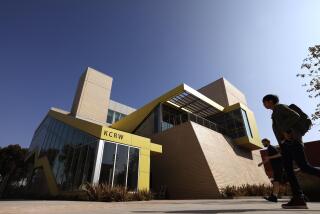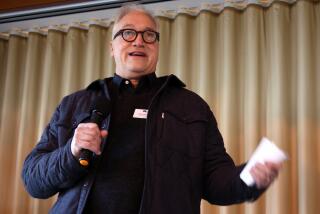BROADCASTERS HEAR GOOD NEWS AT NPR PARLEY
WASHINGTON — There was feistiness in the air, and why not?
The 700 broadcasters who attended the annual Public Radio Conference that ended here Sunday had seen National Public Radio resurrect itself from $9 million in red ink that the network ran up four years ago, nearly putting it out of business.
They had learned how to scrounge up pledges, sponsorships, matching grants and other bits of change, making their stations less dependent on the federally supported Corp. for Public Broadcasting.
And Congress seemed warmer toward their perpetual financial plight than at any time in recent memory, as indicated by the keynote address by Rep. John Dingell (D-Mich.).
“The Reagan Administration’s agenda of sanctioning private greed and starving public institutions is rapidly drawing to a close,” he told them, promising that an Administration attempt to slash the CPB budget by $132 million over the next two years will not occur.
“In effect, the Reagan Administration has recommended no further federal funding for public broadcasting,” said the chairman of the House Energy and Commerce Committee, which oversees public broadcasting appropriations. “This abysmally stupid assault on public broadcasting is a national disgrace. I am confident it will be resoundingly defeated in the Congress.”
Following the address, one broadcaster summed up Dingell’s remarks: “Public broadcasting’s long national nightmare is over.”
“That’s a fair characterization,” said NPR President Douglas Bennet. “I don’t see any of us seeing a funding shock like we saw in the early ‘80s.”
It was just four years ago, when former NPR President Frank Mankiewicz ran into the twin squeeze of CPB budget cuts and poor management practices, that NPR teetered on the brink of bankruptcy.
Today, Bennet said, the network, which brings the daily news-magazine shows “All Things Considered” and “Morning Edition” to nearly 300 public stations, is in the black and virtually debtless.
Another conference speaker, NBC News President Lawrence Grossman, was not quite as kind as Dingell in his assessment of public broadcasting’s future, even though that is where his roots are. Until three years ago, Grossman was president of the Public Broadcasting Service, NPR’s television counterpart.
“What’s wrong is that the structure of public broadcasting, as it has been designed in this country, is so diffuse, duplicative, bureaucratic, confusing, frustrating and senseless that it is a miracle you have survived at all,” he said.
Clicking off an alphabet soup of public broadcasting bureaucracies--PBS, CPB, NPR, APR, etc.--Grossman called for a streamlining of the system so that most of the limited public-broadcasting dollars can be used to produce programs rather than to finance a “Rube Goldberg structure” of boards, commissions, panels, staffs and executives.
“It is a system no one in the outside world understands or can penetrate,” he said. “It is a system that keeps public broadcasting at war with itself. It is a system that ensures that public radio and television will remain mired in second-class status with a top-heavy, expensive and stifling bureaucracy.”
Bennet said that NPR has “moved in that direction.” About 65% of CPB grant money now goes directly to the stations rather to NPR, and each of those stations produces most of its own programs locally.
After weathering several years of scratching for dollars at the local level, the actual percentage of each station’s budget that comes from the federal government has been reduced to about 17%, according to Bennet. The bulk comes from pledge drives.
With dues it collects from member stations, foundation grants and a small contribution from CPB, NPR produces its popular news magazines and “Performance Today,” a new live-performance show that is carried by 71 of the member stations.
“We feel very competent as we face the future, but we could do a lot more if we had a lot more funding,” Bennet said.
More to Read
Sign up for Essential California
The most important California stories and recommendations in your inbox every morning.
You may occasionally receive promotional content from the Los Angeles Times.










